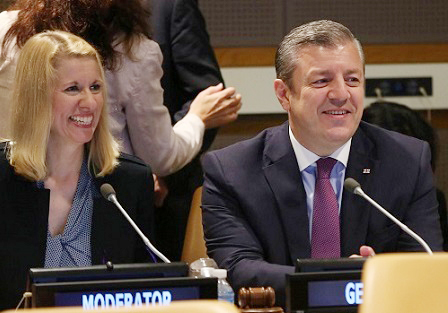PM Kvirikashvili showcases Georgia’s role as innovative economic hub at UN

"Georgia's chosen approach [is] to build effective, accountable and inclusive institutions at all levels, and for Georgia we are pleased to say it is working."
Georgia’s Prime Minister Giorgi Kvirikashvili spoke these words at the United Nations (UN) General Assembly about the achievements and plans of the Georgian Government towards e-governance, transparency and public service delivery.
On Monday, for the first time in history, Georgia hosted a high level meeting on e-governance, transparency and public services within the UN General Assembly’s (UNGA’s) 71st session in New York, United States (US). The event was supported by Estonia, South Korea, Belgium and the United Nations Development Program (UNDP).
Discussed E-gov, Transparency & Public Services at #Georgia, #Estonia, Rep. of #Korea, #UNDP event. #UNGA#UNGA71https://t.co/qvVWz7v8Rypic.twitter.com/q17FQtENrE
— Giorgi Kvirikashvili (@KvirikashviliGi) September 19, 2016
Kvirikashvili highlighted the progress made by Georgia as it worked to implement the Sustainable Development Goals (SDGs).
Our Government regards the implementation of Goal 16, which aims to "build effective, accountable and inclusive institutions at all levels", as a priority. It is an integral part of our efforts to meet EU requirements under the Georgia-EU Association Agreement and it is an area in which I am delighted to say we are making great strides,” Kvirikashvili said.
This is in no small part thanks to the UNDP, whose support and contributions have been invaluable to our efforts.”
The Georgian top official then spoke about some of his country’s success stories, believing Georgia's experience could "provide important lessons to other countries seeking the same development path".
Listen to the PM's full speech below.
Kvirikashvili specifically mentioned the current Business House project, which when complete will deliver over 600 individual services to businesses in one physical and electronic space.
We began by asking ourselves some fundamental questions: What role can e-governance play for the business sector operating in Georgia? How easily can business operators access the services we provide for them? How much will our economy benefit from making the business sector's life easier? How does this relate to the well-being of our citizens? Responses [to these questions] led us to launch a new project called Business House,” Kvirikashvili said
He explained Business House was a "ground-breaking model” based on the principle of public-private partnership and ensured provision of services by various ministries and state agencies in one space, and through one single e-platform.
He believed the primary beneficiaries of an advanced and modern government should be the country's citizens; and this was why his Government had implemented a series of major initiatives with the idea that technology should reduce red tape and make their lives easier.
Kvirikashvili said today, through e-governance in Georgia:
- Citizens/businesses should provide their information to the Government only once. All customer information will be exchanged among Governmental bodies internally using data exchange infrastructure;
- All services by default will be created and used digitally;
- Customers can go to a single office or website to access all Government services (19 ministries and up to 50 agencies);
- All services will be available everywhere, in any Governmental regional office throughout the country.
Kvirikashvili also stressed the need to offer modern services to people all over the country. In large cities the public can go to Public Service Halls to access more than 200 services however in smaller villages and towns, people did not have access to such facilities, hence the creation of Community Centres (CCs).
Through the Community Centers [people living in the regions] now have access to major services … without having to travel to the municipal centre or to the capital,” Kvirikashvili said.
Crucially, this makes it easier for citizens to participate in decision-making processes: CCs bring together modern technologies, public and private sector services, libraries, free internet and an e-library as well as venues for civic engagement in one single area, which allows us to address a number of challenges at the local level.”
Kvirikashvili referred to two examples where Georgia had successfully harnessed e-governance:
- e-request of public information
- e-government Commission
He noted the importance of citizens having free and easy access to information and to achieve this, his team had launched an electronic communication service called 'Citizens' Portal'.
This service allows citizens to interact with the Government electronically. It allows individuals to submit requests for public information to 60 public organisations, track the request sent and receive replies electronically," he said.
Achieving the Sustainable Development Goals is not easy, especially Goal 16, but it is certainly not impossible. What is needed in my opinion is a clear plan, a national blueprint, developed by transparent governmental agencies which guarantees respect of the rule of law and human rights.”
 Tweet
Tweet  Share
Share